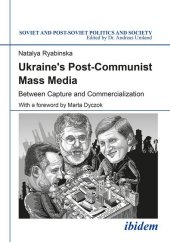 Neuerscheinungen 2017Stand: 2020-02-01 |
Schnellsuche
ISBN/Stichwort/Autor
|
Herderstraße 10
10625 Berlin
Tel.: 030 315 714 16
Fax 030 315 714 14
info@buchspektrum.de |

Marta Dyczok, Natalya Ryabinska, Andreas Umland
(Beteiligte)
Ukraine´s Post-Communist Mass Media
Between Capture and Commercialization
Herausgegeben von Umland, Andreas; Mitarbeit: Dyczok, Marta
2017. 186 S. 210 mm
Verlag/Jahr: IBIDEM 2017
ISBN: 3-8382-1011-5 (3838210115)
Neue ISBN: 978-3-8382-1011-7 (9783838210117)
Preis und Lieferzeit: Bitte klicken
Natalya Ryabinska calls into question the commonly held opinion that the problems with media reform and press freedom in former Soviet states merely stem from the cultural heritage of their communist (and pre-communist) past. Focusing on Ukraine, she argues that, in the period after the fall of communism, peculiar new obstacles to media independence have arisen. They include the telltale structure of media ownership, with news reporting being concentrated in the hands of politically engaged business tycoons, the fuzzy and contradictory legislation of the media realm, and the informal institutions of political interference in mass media.
The book analyzes interrelationships between politics, the economy, and media in Ukraine, especially their shadowy sides guided by private interests and informal institutions. Being embedded in comparative politics and post-communist media studies, it helps to understand the nature and workings of the Ukrainian media system situated in-between democracy and authoritarianism. It offers insights into the inner logic of Ukraine´s political system and institutional arrangement in the post-Soviet period. Based on empirical data of 1994-2013, this study also highlights many of the barriers to democratic reforms that have been persisting in Ukraine since the Revolution of Dignity of 2013-2014.
"Natalya Ryabinska has written a very informative and well-timed book. By referring to the ´fluid´ state of Ukrainian media she masterfully maneuvers between general trends and tendencies detected in the rich corpus of transitology research and matches those with detailed subtleties of the studied context. By vividly describing relationships between polity, economy, and media, she progressively releases the statement that threats to media freedom, its independence, and further democratization in Ukraine stem not from a lack of appropriate legislation (i.e. formal institutions) but rather local conditions and practices shaped through a complex variety of contextually destined political and economic influences. [...] this book achieves much more-it offers fresh insights into the rises and falls of ´daily democracy´ in Ukraine." -Auks Balcytien , Professor of Journalism, Vytautas Magnus University at Vilnius, Lithuania
Dr. Natalya Ryabinska is Assistant Professor of Sociology at the Collegium Civitas at Warsaw. She studied at the Moscow School of Social and Economic Sciences, Karazin National University of Kharkiv, and Polish Academy of Sciences, where she has been recently also teaching in the doctoral programs in sociology and political science. Her papers have appeared in Problems of Post-Communism, Global Media Journal, Polish Sociological Review, and Central European Journal of Communication.


